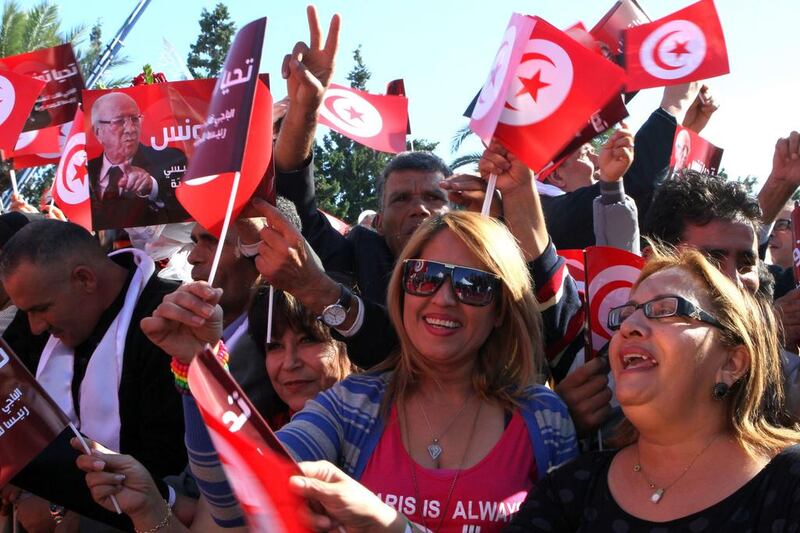TUNIS // The Tunis neighbourhood of Mourouj is a mix of low-rise and high-rise housing, with a scattering of small businesses and a tramway to the city centre. Many households struggle on low or sporadic earnings. Some women wear the Islamic headscarf, others don’t — that isn’t a big issue among locals.
It was areas like Mourouj that brought the Islamist party Ennahda to power in October 2011, nine months after the revolution that ended the regime of Zine El Abidine Ben Ali.
Mourouj, like the country overall, snubbed the Islamists in last week's vote, delivering victory to a new party, the centrist, non-religious Nidaa Tounes.
“What did we do the revolution for? We did it for the poor people, so that they could eat, and live,” said Rabeh Nasri, a high-school cleaner who has three children to support.
“We don’t really care which party it is — Ennahda or Nidaa or any other party. We want someone who will get the country back to work.” Her husband, a cook, was laid off from his job and has yet to find another, she added.
In Mourouj, which straddles two parliamentary constituencies, support for Ennahda fell to 28-31 per cent in last week’s vote. Back in 2011, the Islamist Party had secured more than 40 per cent across Mourouj.
The Islamist party was swept into power amid optimism that a revolution led by often jobless young men in provincial towns would bring a turnaround in the economy. It had a track record of opposition to the Ben Ali regime, and its religiously coloured discourse played well with lower-income voters.
Last week, however, many of these same voters turned to Nidaa Tounes, founded in early 2012 by veteran politician, Beji Caid Sebsi, largely in response to the electoral strength of the Islamists. Ask the residents of Mourouj about this shift in sympathies, and the economy — lack of jobs and food price inflation — is the constant refrain.
“Ennahda did a big campaign [in 2011] and promised us lots of good things, but later they didn’t seem to care about the ordinary citizen. Life just got more expensive,” said Mrs Nasri.
Nidaa Tounes secured almost 40 per cent of seats in the new parliament. Ennahda saw its share of seats slide to 32 per cent, down from the 41 per cent it had in the outgoing constituent assembly — which acted as an interim parliament as it drafted the new constitution.
A political stand-off in 2013 resulted from two political assassinations which Ennahda’s opponents, including Nidaa Tounes, blamed on what they said was the Ennahda-led government’s complacency when faced with the rise of small radical Islamist groups.
That crisis almost threw Tunisia’s transition to democracy off-track. However, last January, Ennahda ceded power voluntarily to a non-party cabinet headed by private-sector executive Mehdi Jomaa as interim prime minister.
Last week's election results revealed a clear north-south divide. Ennahda remained the most popular party in the country's four southernmost constituencies — including Gabes, which contains the hometown of Ennahda leader Rached Ghannouchi. And it drew even with Nidaa Tounes in six central constituencies, including in the heartlands of the revolution — Sidi Bouzid and Kasserine.
Although these areas include some of the poorest parts of the country, they are also the most socially and religiously conservative, notes Radwan Masmoudi, who heads the Center for the Study of Islam and Democracy think tank. Here religious and cultural factors may have come into play, despite the poverty.
Nidaa Tounes for its part showed it was aware that much of the electorate is pious and would be alienated by any antireligious tone in its campaigning, said Mr Masmoudi. “Nidaa Tounes understands the importance of religion better than Ben Ali did,” he said.
That helped the new party wrest votes from Ennahda, as it showed that it, too, respects Tunisia’s Islamic identity.
For Rafik Abdesselam, a senior Ennahda member who served as foreign minister under the Ennahda-led government, “the message from these results is that people want two big parties, instead of political fragmentation — as in any traditional democracy in fact.”
He conceded that the threat of armed Islamist groups had also been a factor: “but people will discover that this problem is related to the complexity of the situation on a regional level”.
In Libya, Tunisia’s neighbour to the south, the government has no effective nationwide control and along the western border with Algeria security forces of the two countries are co-operating on combating Islamist militant groups.
Mr Sebsi is running for president in an election on November 23, as some other parties prepare to unite around one presidential candidate who could present him with serious competition.
If some observers, and many of its political opponents, warn that Nidaa Tounes includes in its ranks many figures from Ben Ali’s former ruling party, this does not appear to be a concern for voters in Mourouj.
“Long live Bejbouj!” said Mrs Nasri, using a popular nickname for the 87-year-old former prime minister Mr Sebsi. “He’s elderly, he has politics on the brain, he’s going to maybe make a go of it.” However, like many in the neighbourhood, she struggles to name any other politician in the party apart from Mr Sebsi, who was three times a minister under the country’s revered post-independence leader Habib Bourguiba.
For Larbi Sadiki, a professor of international relations at Qatar University, Ennahda, with its focus on consensual politics, has “tried to please everyone”. It would do well to focus instead on building a clear identity in parliamentary opposition over the next five years, he believes.
However, the party is this week debating whether to aim to join a government led by Nidaa Tounes, with perhaps a few cabinet seats. It fears that if left “on the periphery of power”, at a time when democratic institutions are still being consolidated, it would be left “with no backup system whatsoever” should Nidaa Tounes in power veer towards authoritarianism, said Professor Sadiki.
foreign.desk@thenational.ae





